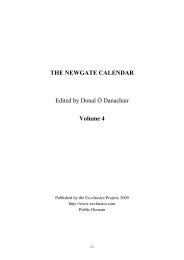PDF format (1.55 Mb) - The Ex-Classics Web Site
PDF format (1.55 Mb) - The Ex-Classics Web Site
PDF format (1.55 Mb) - The Ex-Classics Web Site
You also want an ePaper? Increase the reach of your titles
YUMPU automatically turns print PDFs into web optimized ePapers that Google loves.
THE ANATOMY OF MELANCHOLY<br />
Good Hope] are blackamoors, and yet both alike distant from the equator: nay they that dwell in<br />
the same parallel line with these Negroes, as about the Straits of Magellan, are white coloured,<br />
and yet some in Presbyter John's country in Ethiopia are dun; they in Zeilan and Malabar parallel<br />
with them again black: Manamotapa in Africa, and St. Thomas Isle are extreme hot, both under<br />
the line, coal black their inhabitants, whereas in Peru they are quite opposite in colour, very<br />
temperate, or rather cold, and yet both alike elevated. Moscow in 53. degrees of latitude extreme<br />
cold, as those northern countries usually are, having one perpetual hard frost all winter long; and<br />
in 52. deg. lat. sometimes hard frost and snow all summer, as Button's Bay, &c., or by fits; and<br />
yet England near the same latitude, and Ireland, very moist, warm, and more temperate in winter<br />
than Spain, Italy, or France. Is it the sea that causeth this difference, and the air that comes from<br />
it: Why then is Ister so cold near the Euxine, Pontus, Bithynia, and all Thrace; frigidas regiones<br />
Maginus calls them, and yet their latitude is but 42. which should be hot: Quevira, or Nova<br />
Albion in America, bordering on the sea, was so cold in July, that our Englishmen could hardly<br />
endure it. At Noremberga in 45. lat. all the sea is frozen ice, and yet in a more southern latitude<br />
than ours. New England, and the island of Cambrial Colchos, which that noble gentleman Mr.<br />
Vaughan, or Orpheus junior, describes in his Golden Fleece, is in the same latitude with little<br />
Britain in France, and yet their winter begins not till January, their spring till May; which search<br />
he accounts worthy of an astrologer: is this from the easterly winds, or melting of ice and snow<br />
dissolved within the circle arctic; or that the air being thick, is longer before it be warm by the<br />
sunbeams, and once heated like an oven will keep itself from cold? Our climes breed lice,<br />
Hungary and Ireland male audiunt in this kind; come to the Azores, by a secret virtue of that air<br />
they are instantly consumed, and all our European vermin almost, saith Ortelius. Egypt is<br />
watered with Nilus not far from the sea, and yet there it seldom or never rains: Rhodes, an island<br />
of the same nature, yields not a cloud, and yet our islands ever dropping and inclining to rain.<br />
<strong>The</strong> Atlantic Ocean is still subject to storms, but in Del Zur, or Mare pacifico, seldom or never<br />
any. Is it from tropic stars, apertio portarum, in the dodecotemories or constellations, the moon's<br />
mansions, such aspects of planets, such winds, or dissolving air, or thick air, which causeth this<br />
and the like differences of heat and cold? Bodin relates of a Portugal ambassador, that coming<br />
from Lisbon to Danzig in Spruce, found greater heat there than at any time at home. Don Garcia<br />
de Sylva, legate to Philip III., king of Spain, residing at Ispahan in Persia, 1619, in his letter to<br />
the Marquess of Bedmar, makes mention of greater cold in Ispahan, whose lat. is 31, than ever<br />
he felt in Spain, or any part of Europe. <strong>The</strong> torrid zone was by our predecessors held to be<br />
uninhabitable, but by our modern travellers found to be most temperate, bedewed with frequent<br />
rains, and moistening showers, the breeze and cooling blasts in some parts, as Acosta describes,<br />
most pleasant and fertile. Arica in Chile is by report one of the sweetest places that ever the sun<br />
shined on, Olympus terræ, a heaven on earth: how incomparably do some extol Mexico in Nova<br />
Hispania, Peru, Brazil, &c., in some again hard, dry, sandy, barren, a very desert, and still in the<br />
same latitude. Many times we find great diversity of air in the same country, by reason of the site<br />
to seas, hills or dales, want of water, nature of soil, and the like: as in Spain Arragon is aspera et<br />
sicca, harsh and evil inhabited; Estremadura is dry, sandy, barren most part, extreme hot by<br />
reason of his plains; Andalusia another paradise; Valencia a most pleasant air, and continually<br />
green; so is it about Granada, on the one side fertile plains, on the other, continual snow to be<br />
seen all summer long on the hill tops. That their houses in the Alps are three quarters of the year<br />
-44-
















